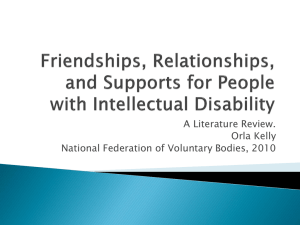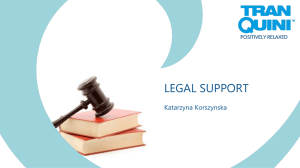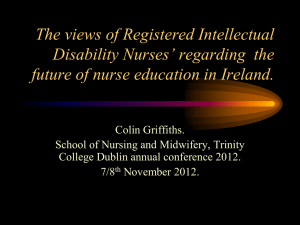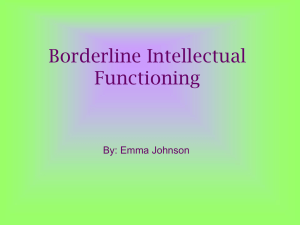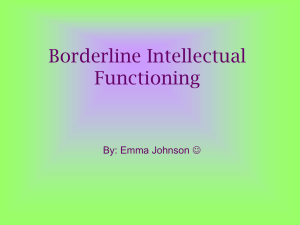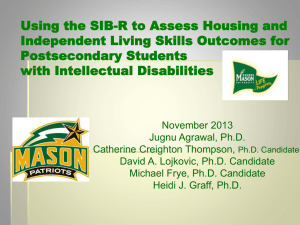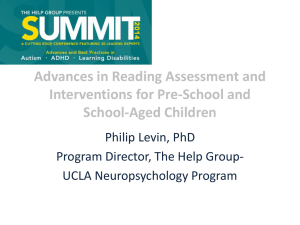The Nisonger Center
advertisement
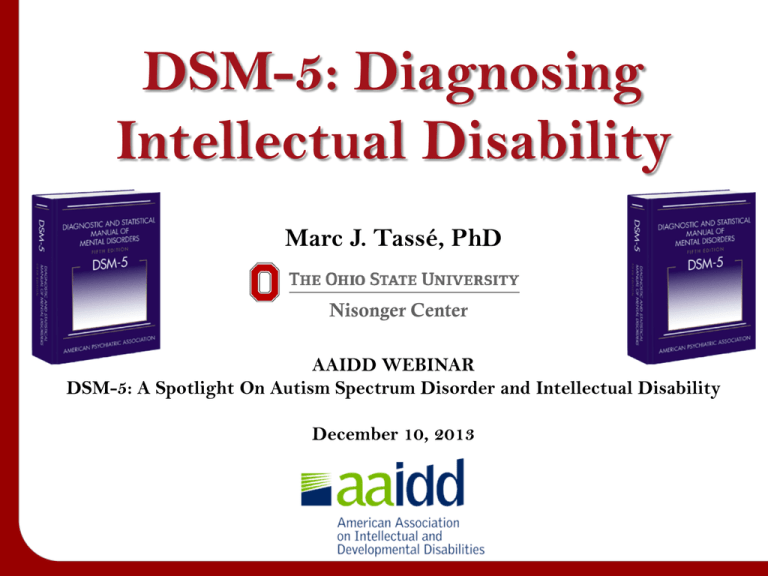
DSM-5: Diagnosing Intellectual Disability Marc J. Tassé, PhD Nisonger Center AAIDD WEBINAR DSM-5: A Spotlight On Autism Spectrum Disorder and Intellectual Disability December 10, 2013 American Psychiatric Association DSM – I: DSM – II: DSM – III: DSM – IV: 1952 1968 1980 => DSM–III-R: 1987 1994 => DSM–IV-TR: 2000 DSM – 5: 2013 (12-year process) Nisonger Center DSM-5 (APA, 2013) Development Timeline: 2000-2006: publication « white papers » various topics related to mental disorders 2006-2008: David J. Kupfer and Darrel A. Regier – chair/co-chair => work groups 2008-2010: review of the research literature, analysis of existing datasets, first drafts of chapters, publication of drafts on www.dsm5.org 2010-2012: clinical trials, analyses of results, revisions 2012: last public consultations, final revisions to drafts 2013: publication of DSM-5 Nisonger Center DSM-5 DSM-5 CLASSIFICATION Section I (DSM-5 Basics) Section II (Diagnostic Criteria and Codes) 22 mental disorder categories: • • • • • Neurodevelopmental Disorders Schizophrenia Spectrum and Other Psychotic Disorders Bipolar and Related Disorders Depressive Disorders … Nisonger Center DSM-5 DSM-5 CLASSIFICATION Section I (DSM-5 Basics) Section II (Diagnostic Criteria and Codes) 22 mental disorder categories: • Neurodevelopmental Disorders • • • • Schizophrenia Spectrum and Other Psychotic Disorders Bipolar and Related Disorders Depressive Disorders disorders are a group of Neurodevelopmental …conditions with onset in the developmental period. Nisonger Center DSM-5 Neurodevelopmental Disorders Intellectual Communication Autism Spectrum Disabilities Disorders Disorder Attention-Deficit/ Hyperactivity Disorder Nisonger Center Specific Learning Disorder Other Motor Disorders Neurodevelopmental Disorders Neurodevelopmental Disorders Work Group • Susan Swedo, M.D., National Institute of Mental Health • • • • • • • • • • • • *Gillian Baird, M.B., Guy's and St. Thomas' Hospital *Edwin Cook, M.D., University of Illinois at Chicago *Francesca Happé, Ph.D., King's College London James Harris, M.D., Johns Hopkins University Walter Kaufmann, M.D., Harvard University Bryan King, M.D., University of Washington *Catherine Lord, Ph.D., Weill Cornell Medical College *Joseph Piven, M.D., University of North Carolina, Chapel Hill *Sally Rogers, Ph.D., University of California, Davis *Sarah Spence, M.D., Ph.D., Harvard University *Amy Wetherby, Ph.D., Florida State University *Harry Wright, M.D., University of South Carolina Nisonger Center DSM-5 Neurodevelopmental Disorders Intellectual Communication Autism Spectrum Disabilities Disorders Disorder Attention-Deficit/ Hyperactivity Disorder Nisonger Center Specific Learning Disorder Other Motor Disorders Neurodevelopmental Disorders DSM-5 Neurodevelopmental Disorders Intellectual Communication Autism Spectrum Disabilities Disorders Disorder Attention-Deficit/ Hyperactivity Disorder Intellectual Disability Global Developmental Delay Unspecified Intellectual Disability Nisonger Center Specific Learning Disorder Other Motor Disorders Neurodevelop- mental Disorders DSM-5 Neurodevelopmental Disorders Intellectual Communication Autism Spectrum Disabilities Disorders Disorder Attention-Deficit/ Hyperactivity Disorder Intellectual Disability Global Developmental Delay Unspecified Intellectual Disability Nisonger Center Specific Learning Disorder Other Motor Disorders Neurodevelop- mental Disorders DSM-5 319. Intellectual Disability (Intellectual Developmental Disorder) [ICD-11] “… is a disorder with onset during the developmental period that includes both intellectual and adaptive functioning deficits in conceptual, social, and practical domains.“ - DSM- 5, page 33 Nisonger Center DSM-5 319. Intellectual Disability (Intellectual Developmental Disorder) “Note: The diagnostic term Intellectual Disability is the equivalent term for the ICD-11 diagnosis of Intellectual Developmental Disorders. Although the term Intellectual Disability is used throughout this manual, both terms are used in the title to clarify relationships with other classification systems. Moreover, a federal statute in the United States (Public Law 111-256, Rosa’s law) replaces the term mental retardation with intellectual disability, and research journals use the term Intellectual Disability. Thus, Intellectual Disability is the term in common use by medical, educational, and other professions, and by the lay public and advocacy groups.” DSM-5, p. 33 Nisonger Center DSM-5 319. Intellectual Disability (Intellectual Developmental Disorder) “Note: The diagnostic term Intellectual Disability is the equivalent term for the ICD-11 diagnosis of Intellectual Developmental Disorders. Although the term Intellectual Disability is used throughout this manual, both terms are used in the title to clarify relationships with other classification systems.. Moreover, a federal statute in the United States (Public Law 111-256, Rosa’s law) replaces the term mental retardation with intellectual disability, and research journals use the term Intellectual Disability. Thus, Intellectual Disability is the term in common use by medical, educational, and other professions, and by the lay public and advocacy groups.” DSM-5, p. 33 Nisonger Center ICD-11 (WHO, in preparation) Intellectual Developmental Disorders “Disorders of intellectual development refer to a group of etiologically diverse conditions originating during the developmental period characterized by significantly below average intellectual functioning and adaptive behavior that is approximately two or more standard deviations below the mean (≈<2.3 percentile), as established based on appropriately normed, standardized tests or by comparable clinical indicators when standardized testing is unavailable. …” Nisonger Center DSM-5 AAIDD 319. Intellectual Disability Intellectual Disability (Intellectual Developmental Disorder) “… is a disorder with onset during “… is characterized by significant limitations both in intellectual functioning and in adaptive behavior as expressed in conceptual, social, and practical adaptive skills. The disability originates before age - APA, 2013, p. 18.“ the developmental period that includes both intellectual and adaptive functioning deficits in conceptual, social, and practical domains.“ 33 1 Nisonger Center - Schalock et al., 2010, p. DSM-5 319. Intellectual Disability (Intellectual Developmental Disorder) The following three criteria must be met: A. Deficits in intellectual functions, such as reasoning, problem-solving, planning, abstract thinking, judgment, academic learning and learning from experience, and practical understanding confirmed by both clinical assessment and individualized, standardized intelligence testing. - DSM-5, p. 33 Nisonger Center Intellectual Disability Diagnostic Features (p. 37) Criterion A refers to intellectual functions … intellectual functioning is typically measured with individually administered and psychometrically valid, comprehensive, culturally appropriate, psychometrically sound tests of intelligence. … two standard deviations or more below the population mean, including a margin of measurement error (generally + 5 points) … a score of 65 – 75 (70 ± 5). Factors that may affect test scores include practice effects and the “Flynn effect”…. Nisonger Center Intellectual Disability Diagnostic Features (p. 37) Criterion A refers to intellectual functions … intellectual functioning is typically measured with individually administered and psychometrically valid, comprehensive, culturally appropriate, psychometrically sound tests of intelligence. … two standard deviations or more below the population mean, including a margin of measurement error (generally + 5 points) … a score of 65 – 75 (70 ± 5). Factors that may affect test scores include practice effects and the “Flynn effect”…. Nisonger Center Intellectual Functioning ”IQ test scores are approximations of conceptual functioning but may be insufficient to assess reasoning in real-life situations and mastery of practical tasks. For example, a person with an IQ score above 70 may have such severe adaptive behavior problems in social judgment, social understanding, and other areas of adaptive functioning that the person’s actual functioning is comparable to that of individuals with a lower IQ score. Thus, clinical judgment is needed in interpreting the results of IQ tests.” - DSM-5, p. 37 Nisonger Center DSM-5 319. Intellectual Disability (Intellectual Developmental Disorder) B. Deficits in adaptive functioning that result in failure to meet developmental and sociocultural standards for personal independence and social responsibility. Without ongoing support, the adaptive deficits limit functioning in one or more activities of daily life, such as communication, social participation, and independent living, and across multiple environments, such as home, school, work, and recreation. - DSM-5, p. 33 Nisonger Center Intellectual Disability Diagnostic Features (p. 37 & 38) Criterion B – adaptive functioning involves adaptive reasoning, in three domains: conceptual, social, and practical. … criterion B is met when at least ONE domain of adaptive functioning, conceptual, social or practical is sufficiently impaired that ongoing support is needed…. Adaptive functioning is assessed using both clinical evaluation and individualized, culturally appropriate, psychometrically sound measures. Standardized measures are used with knowledgeable informants (e.g., parent or other family member, teacher, counselor, care provider) and the individual to the extent possible. Nisonger Center Intellectual Disability Diagnostic Features (p. 37 & 38) Criterion B – adaptive functioning involves adaptive reasoning, in three domains: conceptual, social, and practical. … criterion B is met when at least ONE domain of adaptive functioning, conceptual, social or practical is sufficiently impaired that ongoing support is needed…. Adaptive functioning is assessed using both clinical evaluation and individualized, culturally appropriate, psychometrically sound measures. Standardized measures are used with knowledgeable informants (e.g., parent or other family member, teacher, counselor, care provider) and the individual to the extent possible. Nisonger Center Intellectual Disability Diagnostic Features (p. 37 & 38) Criterion B – adaptive functioning “Additional sources of information include educational, developmental, medical, and mental health evaluations. Scores from standardized measures and interview sources must be interpreted using clinical judgment.” “Adaptive functioning may be difficult to assess in a controlled setting (e.g., prisons, detention centers); if possible corroborative information reflecting functioning OUTSIDE those settings should be obtained.” Nisonger Center Intellectual Disability Diagnostic Features (p. 37 & 38) Criterion B – adaptive functioning “Additional sources of information include educational, developmental, medical, and mental health evaluations. Scores from standardized measures and interview sources must be interpreted sing clinical judgment.” “Adaptive functioning may be difficult to assess in a controlled setting (e.g., prisons, detention centers); if possible corroborative information reflecting functioning OUTSIDE those settings should be obtained.” Nisonger Center Intellectual Disability Diagnostic Features (p. 38) Criterion B – adaptive functioning “To meet diagnostic criteria for ID, the deficits in adaptive functioning must be directly related to the intellectual impairments described in Criterion A.” Nisonger Center DSM-5 319. Intellectual Disability (Intellectual Developmental Disorder) C. Onset of intellectual and adaptive deficits during the developmental period. - DSM-5, p. 33 “Criterion C, onset during the developmental period, refers to recognition that intellectual and adaptive deficits are present during the childhood or adolescence.” - DSM-5, p. 38 Nisonger Center DSM-5 SPECIFIERS The use of specifiers for the neurodevelopmental disorder diagnoses enriches the clinical description of the individual’s clinical course and current symptomatology. • • • • age of onset severity level of ID … associated with a medical (e.g., seizure disorder) … etiology: genetic condition (e.g., trisomy 21) or environmental factor (e.g., low birth weight) Nisonger Center Intellectual Disability SPECIFIER - CURRENT SEVERITY OF ID: The severity levels of ID are defined on the basis of adaptive functioning, and not IQ scores, because it is adaptive functioning that determines the level of supports required. Moreover, IQ measures are less valid in the lower end of the IQ range. Severity levels of ID: Mild, Moderate, Severe, & Profound. - DSM-5, p. 33 Nisonger Center Intellectual Disability SEVERITY LEVELS FOR INTELLECTUAL DISABILITY: Conceptual Domain Severity Social Domain Practical Domain Mild Moderate Severe Profound - DSM-5, p. 34-36 Nisonger Center Similarities and Differences Nisonger Center Intellectual Disability DSM-5-AAIDD: Similarities and Differences. Same: Same: Same: Name “intellectual disability” Intelligence => IQ criterion AB domains DSM-5 (p. 40): “the AAIDD also uses the term intellectual disability with a similar meaning to the term used in this manual.” Nisonger Center Intellectual Disability DSM-5-AAIDD: Similarities and Differences. Same: Same: Same: ???: Name “intellectual disability” IQ “< 2 standard deviations below the mean” AB domains Age of onset Nisonger Center Intellectual Disability DSM-5-AAIDD: Similarities and Differences. Same: Same: Same: ???: Different: Different: Name “intellectual disability” IQ AB domains Age of onset Severity levels Operational definition of “significant deficits” in AB Different: Link AB deficits to IQ Nisonger Center DSM-5: Diagnosing Autism Spectrum Disorder Jarrett Barnhill, MD, DFAPA, FAACAP AAIDD WEBINAR DSM-5: A Spotlight On Autism Spectrum Disorder and Intellectual Disability December 10, 2013

